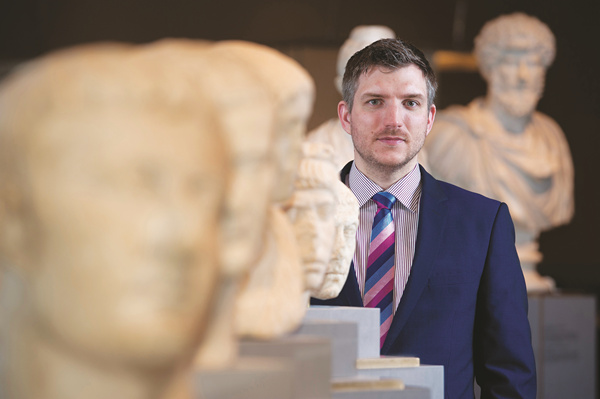
 |
|
China scholar Sascha Priewe has just been appointed managing director at the Royal Ontario Museum. PROVIDED BY ROM |
For Sascha Priewe, the question "Where do you live?" might not be so easy to answer. According to his resume posted on the website of Royal Ontario Museum (ROM), the German-born archaeologist and curator has lived in Sweden, China and the UK. And since March 2015, Priewe, the new managing director of three of the ROM's eight Centres of Discovery, has started a brand new life in Toronto.
"Toronto is a fantastic city, vibrant and culturally diverse," said Priewe. "And as a bonus, it is a great base for outdoor activities."
It seems a natural reaction for a German who was born in Mönchengladbach, a mid-sized landlocked city famous mainly for its soccer club. For young Priewe growing up, however, Chinese characters were more interesting than football.
Priewe will never forget how impressed he was about 15 years ago when he first looked into a friend's Chinese textbook. "I was so surprised," he said. He couldn't even find the suitable word to describe his feelings.
These image-like characters, since then, have led him into a mysterious and totally new world. Gradually he has fallen in love with traditional Chinese culture, and even got a Chinese name: Pei Yanhua.
Priewe speaks fluent Chinese, sometimes with a Beijing accent. Although he has studied Chinese over the past decade and is able to read academic Chinese journals, he sometimes gets confused in public places where common sayings are largely used. These challenges, however, only increase Priewe's determination to dig deep and explore. For him, the "complexity and mysteriousness" of Chinese culture is the most engaging thing for a foreigner.
Priewe got his PhD in archaeology at Oxford. His research mainly focused on the Neolithic and Bronze ages of the Yangtze River.
In 2001, Priewe went to China for the first time. He stayed in Beijing for a few days, wandering around old streets and visiting galleries and museums. He recalls that there were not as many skyscrapers in Beijing at that time, especially outside of the Third Ring.
By the time he returned in 2004 as the cultural attaché at the German Embassy in Beijing, things had changed a lot. Priewe was shocked by the high-speed development of the old city and felt like he was driving through a concrete forest.
In order to get ready for the 2008 Olympic Games, the whole city was in a final sprint. New buildings were constructed every day while old objects and memories silently disappeared. "I have never seen such an energetic city before," said Priewe.
In this ever changing atmosphere, Priewe had constantly attempted to grasp the unchanging and the eternal things still rooted in the ancient culture. Weekends he went to the Palace Museum, the Summer Palace and antique stores in Panjia Yuan. During the two years he lived and worked in Beijing, Priewe searched for the connection between the culture and those Chinese characters that had captivated him years earlier.
And he traveled a lot, a habit since his college years. From 2004 to 2006 he visited a number of cities and towns in northern and southern China. What attracted him most was the Yangtze River, the third longest river in the world.